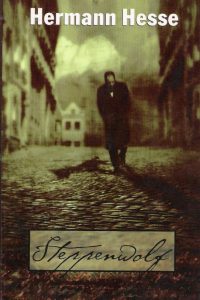
 Literature Guides
Literature Guides
Steppenwolf Quotations and Analysis
Quotations and Analysis
He went on two legs, wore clothes and was a human being, but nevertheless he was in reality a wolf of the Steppes. He had learned a good deal . . . and was a fairly clever fellow. What he had not learned, however, was this: to find contentment in himself and his own life. The cause of this apparently was that at the bottom of his heart he knew all the time (or thought he knew) that he was in reality not a man, but a wolf of the Steppes.”
The Treatise on the Steppenwolf begins with these lines. We have already been told the basic ideas of the treatise by the nephew of Harry’s landlady and by Harry himself. The treatise explains that the Steppenwolf/Harry has within him two distinct character types. He is the ordinary man of civilization and he wants to be a part of this civilized world.
But his other half, the wolf of the Steppes, is a violent and solitary creature which rejects all of civilization. The two type are in constant battle with each other for mastery. The Treatise actually goes on to explain that the multiple selves within any individual is quite complex. But the Treatise offers Harry and fairly simple and straightforward way to understand and explain himself.
“Oh! how stiff you are! Just go straight ahead as if you were walking . . . Dancing, don’t you see, is every bit as easy as thinking, when you can do it, and much easier to learn. Now you can understand why people won’t get the habit of thinking…”
Hermine speaks these lines to Harry as she teaches him to dance. On the surface this is a simple sentiment on the power of dancing. On a deeper level, Hermine is drawing Harry out of his strict confines within one specific aspect of himself. Harry claims that people are too lazy to utilize their minds.
Hermine points out that Harry is just as lazy for neglecting his own body and his sensuous nature. She draws Harry out of his confined way of seeing life only through and intellectual point of view. Once Harry is put in touch with his sensuous side, he finds that he no longer needs Hermine.
“I understood it all. I understood Pablo. I understood Mozart, and somewhere behind me I heard his ghastly laughter. I knew that all the hundred thousand pieces of life’s game were in my pocket . . . I would traverse not once more, but often, the hell of my inner being. One day I would be a better hand at the game. One day I would learn how to laugh. Pablo was waiting for me, and Mozart too.”
These are the final lines in the novel. Following the epiphanies in the Magic Theater in which Pablo reveals all the mysteries to Harry, he claims that he understands it all. Significantly, we as readers may not understand much at all. The novel ends mysteriously and abruptly with Harry claiming to have come to a higher understanding of himself but also facing more inner torment.
Pablo has taken on the appearance of a sage of sorts, and many things have been revealed, but the great mystery of what is beyond the confused self, what is the eternal, and how we may come to find these things all remain mysterious. Hesse leaves us with mystical questions in the end of this novel.



